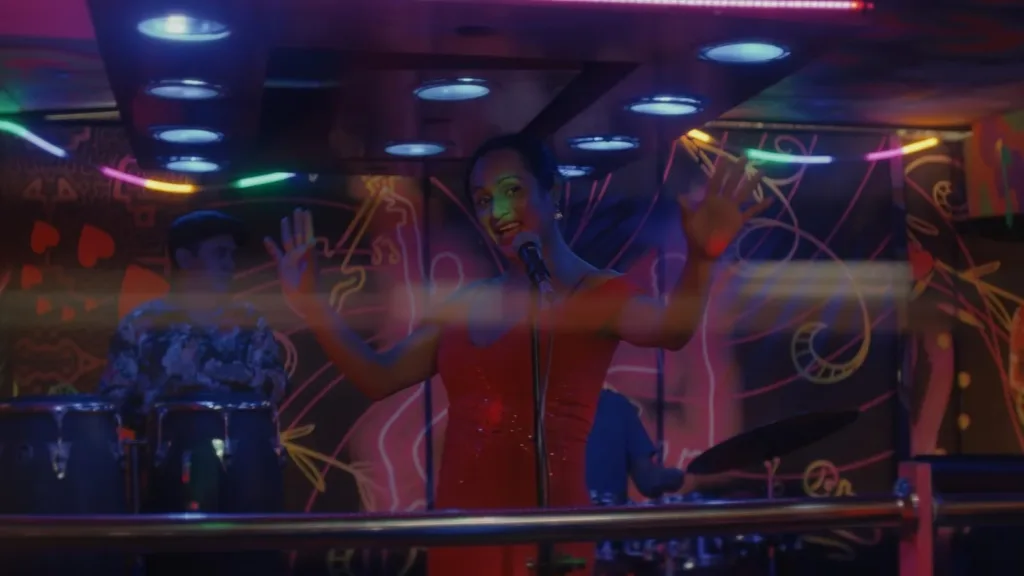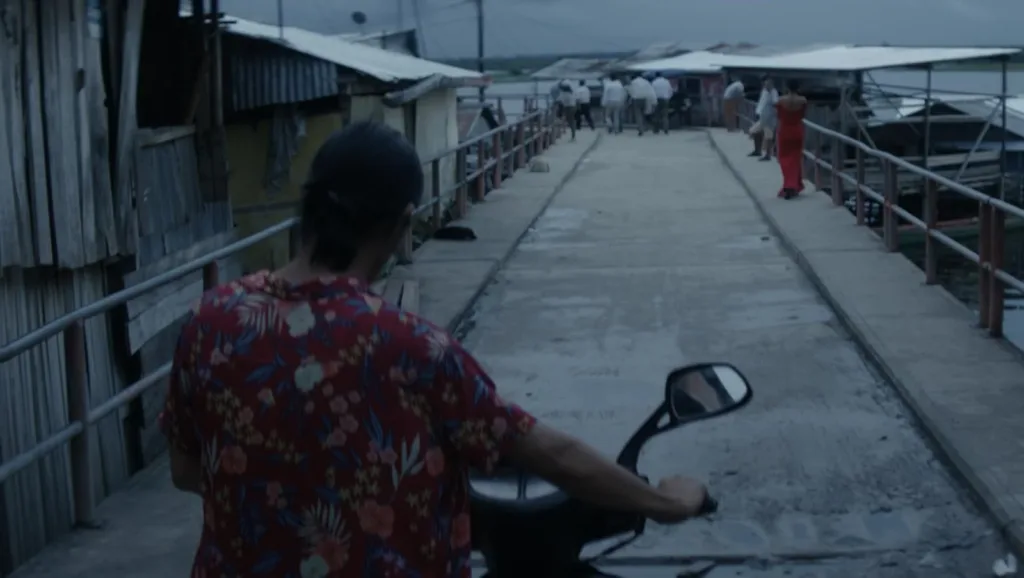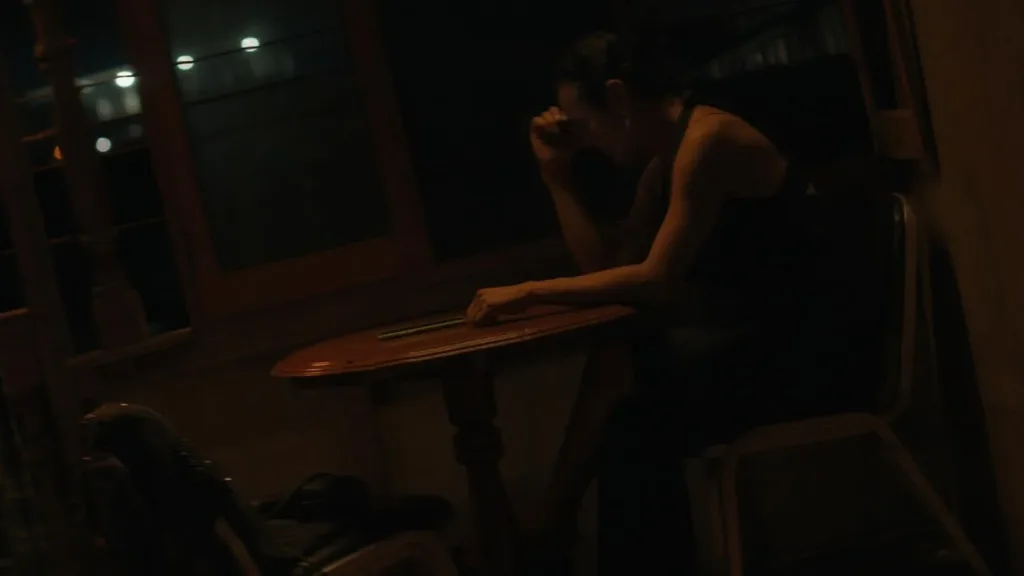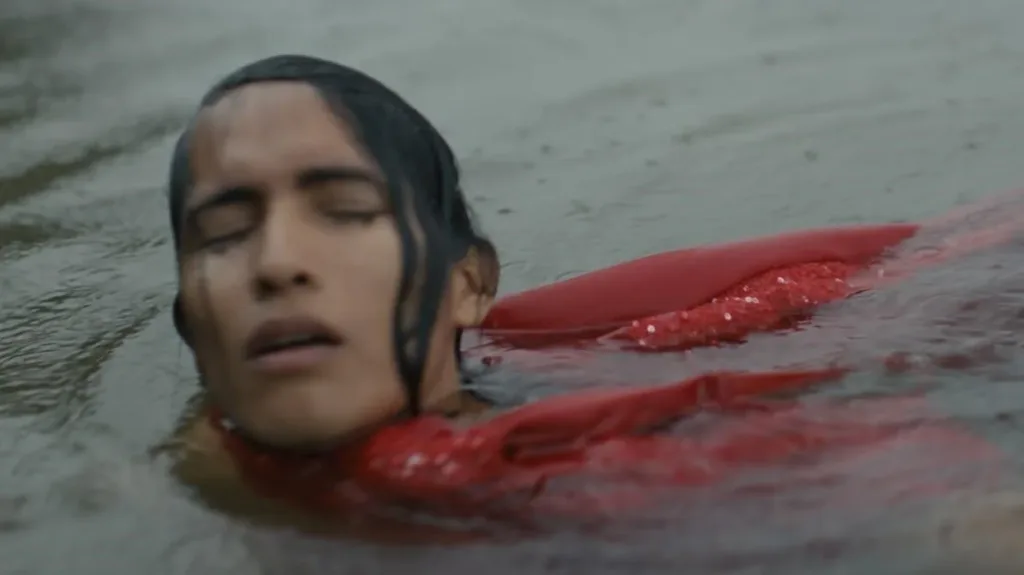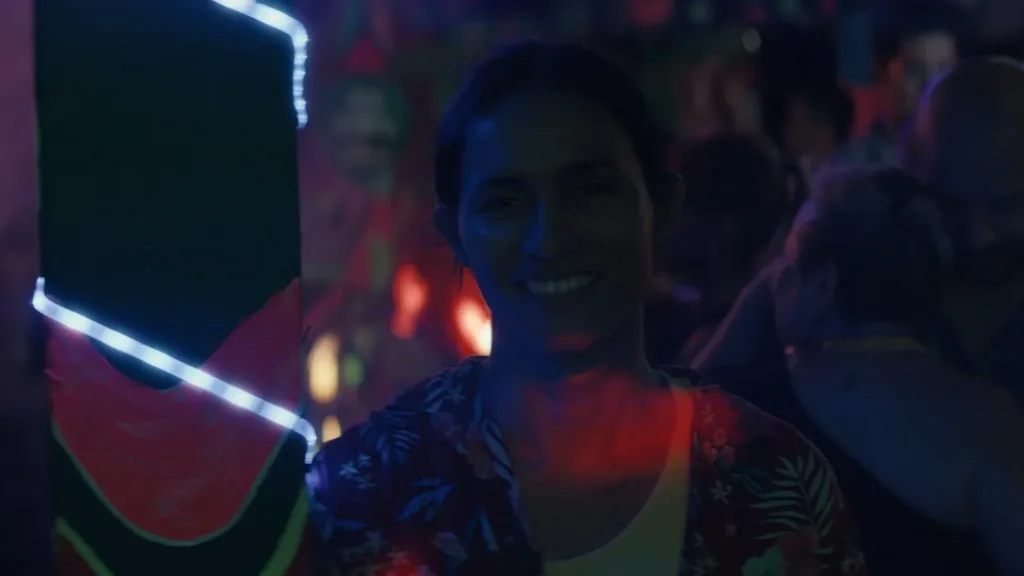The film Fugue takes us on a profound journey. Directed by Mary Jimenez and Bénédicte Liénard, it tells the story of Saor, who accompanies the remains of his lover Valentina back to her hometown in the Peruvian Amazon. What begins as a solemn trip soon becomes an emotional quest as Saor encounters people who knew Valentina in the past, when she was known by her given name, Pol. Bit by bit, Saor discovers the truth about Valentina’s history and death, uncovering a side to her life that was full of fear and sorrow under the severe persecution faced by LGBTQ individuals.
The directors craft this deeply moving tale using a mix of fiction and real testimony. Non-actors who had real experiences share their stories with natural sincerity. Through Saor, we learn about the horrific acts committed against LGBTQ people during Peru’s civil war in a way that is both respectful and impactful. Saor’s own internal struggle adds a deeply human dimension as he comes to understand his partner in new ways.
Cinematic elements like the awe-inspiring Amazon setting and Saor’s evocative voiceovers draw us deeper into his discovery of Valentina’s hidden past. We experience moments of happiness alongside the cruelty revealed, gaining new appreciation for experiences faced by those whose lives have gone undisclosed for too long. Fugue transports us to another place and time through its blended storytelling. But its message is timeless—in reflecting on injustice and loss, we ensure that some lessons of history are not forgotten but borne in light and justice. This film offers viewers a singular portrait of courage against oppression and a journey of healing through remembrance.
Reflections of the Past
The characters in Fugue feel deeply human through the depths revealed in their interactions. At the story’s center is Saor, embarking on an emotional journey through their hometown in search of understanding. As Saor speaks with those who knew his late lover Valentina, pieces of her elusive past fall into place.
We discover Valentina lived for years in this community under the name Pol, keeping parts of her identity cloaked out of necessity. Only through Saor’s discussions with locals do we glimpse her struggles and strengths. Valiant yet vulnerable, she found moments of expression through her nightclub performances while danger surrounded the LGBTQ community.
The inclusion of real testimonies lends these portrayals authenticity beyond what scripted dialogue provides. We feel the witnesses’ lived experiences resonating through their recollections with Saor. Their pain remains palpable, a scar tissue of trauma, but also perseverance in the face of inhumanity.
Saor serves to unveil Valentina in new dimensions, gaining a full picture of her spirit through these reflections. Though many memories arose from forced hiding, her essence was one of passion, as encapsulated in her favorite love song. Even in death, her free soul continues inspiring through the resilience of Saor and other survivors in reclaiming their truths.
Fugue demonstrates how personal histories interconnect within communities. Revelations emerge gradually through compassionate sharing, and real change begins with acknowledging realities too long suppressed. The human connections at its core give this intimate portrait enduring power to open our eyes to lives too easily rendered invisible.
A Visual Journey of Discovery
Directors Mary Jiménez and Bénédicte Liénard bring profound care to their craft. Through lengthy engagement, they earned trust to share truths often untold. Their directorial finesse crafts an intimate viewing experience, pulling us gently into Saor’s troubled mind.
A contemplative, unrushed approach lets individual moments resonate. Silent scenes speak through glances rich in feeling. We linger with Saor at each realization, absorbed in life’s delicate intricacies the film unveils.
Cinematographer Virginie Surdej amplifies this sensory journey. Murky forest filters recast memories in a softer light. Focus blurs between present and past as Saor grapples with loss. Darkened coca huts illuminate subtle revelations through body language alone.
Surdej wields light and shadow to draw us into Saor’s perspective. Hazy recollections drift by in luminous fragments, mirroring the piecemeal nature of Saor’s understanding. Hushed interiors calm turbulent emotions, holding space for grief and acceptance.
Together, the visual storytelling conveys emotional nuance far beyond words could relate. As Saor’s knowledge grows, the lens mirrors their dawning clarity and compounding ache. Subtle yet profound, this film immerses us in an experience of rediscovery and reconciliation through poignant imagery alone. In honoring individual journeys, directors and crew share collective healing for traumas too long buried in darkness.
Weaving Fact with Fiction
Fugue ingeniously blends documentary and drama to shine light into dark corners. Through its nonlinear design, real experiences seamlessly inform the fictional tale.
Flashbacks deepen our understanding of Valentina as Saor’s journey echoes her own flow between past and present. Testimonies lend authentic grit to glimpses of happier times. Loss resonates through every revelation of what suppression forced survivors to conceal while living.
Saor’s quiet voice anchors our focus on their troubled thoughts instead of lines between non-actors. Inner turmoil surfaces through careful pauses and whispered dialog alone. Space remains for individuals to speak from the heart at their own pace through this choice.
Absence of musical cues draws us entirely into rustling forest ambiences. Each crackle and call depicts life persisting despite humankind’s inhumanity. Against this backdrop, whispered traumas assume harrowing weight and intimacy.
Fluid editing interweaves interviews into scenes, like woven threads forming a melancholic tapestry. Glimpses into many personal histories collectively portray a community’s compound sorrows and solidarity. Location transports us into lived worlds to feel each haunting disclosure viscerally.
This film artfully fuses fiction and nonfiction to breathe emotional truth beyond either genre alone. Through its dynamic form, individual resilience emerges as a collective portrait of triumph against oppression’s shadows that linger still too long.
Echoes of the Past
Fugue delves into profound themes still tragically relevant. It explores what happens when persecution drives realities underground and marginalizes entire groups from collective memory.
Through whispers across a river’s flow, we hear of state-endorsed atrocities intended to erase LGBTQ existence. Yet survival persisted against all attempts to rewrite history through enforced forgetting. The film handles these brutal truths respectfully, trusting audiences can infer darkness from glimpsed light.
Identity emerges as a thread throughout, from Valentina concealing her full self to Saor piecing together a life now lost. Nature itself reflects these issues—a lush world continues despite humanity’s cruelty, and memories take root where before lay only sorrow.
Time also plays a role as the past’s weight lingers heavy in an present unable to outrun sorrow’s long shadow. Old wounds reopen through recollections, but speaking representations mend fractured spirits and communities. Perhaps future growth may arise from facing history in full.
Themes interconnect like a riverside village—each disclosure illuminates others in a tapestry too long left incomplete. Fugue proves some mysteries only find solutions through empathy, as individual resilience becomes a collective stand against oppression’s ghosts that refuse to fade. In honoring silenced lives through craft, the film ensures their realities can haunt consciences a while longer.
Illuminating Silenced Voices
Fugue shines a light into dark corners, its images resonating with purpose. By crafting lived realities into a work of art, the film ensures marginalized histories can no longer hide in shadows.
Directors Jimenez and Liénard pursue a goal both social and political: to ensure those forced to conceal full truths for survival will instead find representation. Through non-actors giving voice to unheard experiences, the film champions dignity too frequently denied.
Raising social awareness of struggles few discuss, Fugue draws focus to injustices some work still to undo. By honoring trauma with empathy instead of exploits, it treats survivors with respect long denied. Their testimonies, woven into a narrative both passionate and poignant, may inspire new will to counter ignorance and change.
Art often impacts politics, as does truth confronting denial. This film gifts both power and platform to those determining their own fate. Real stories resonate beyond surface plots, and thought-provoking works can shift mindsets. In lending light to shadows, Fugue impacts by bringing often invisible lives into focus and making injustice impossible to overlook.
Using individual resilience as a collective call, the film transforms survival into strength and ensures those lost find honor in the light. Such works spread from the shadows of oppression they challenged through solidarity in spirit, if not in life.
A Journey of Remembrance
This review has explored Fugue as a thoughtful work highlighting silenced histories through art. Directors and crew skillfully blended testimony with narrative to represent marginalized realities in a poignantly human light.
While some found its pace restrained emotion, the film served its subjects with profound care. Subtle imagery and Saor’s introspective quest mirrored realities of obscured identity and shielded truths. Testament to resilience, it ensures those lost find representation and that injustices can no longer hide in plain sight.
Room for expanding certain perspectives exists, yet Fugue stays with viewers through personal portraits of survival against oppression. Its creators treated sensitive topics with compassion and crafted a tribute moving in subtlety.
For bringing long, untold experiences to new audiences and facilitating communal healing, this film deserves appreciation. While some wounds may never fully mend, works like Fugue begin the important process of acknowledging realities too long buried in denial and shadows. In lending voice to the silenced, it illuminates paths towards greater understanding and justice.
The Review
Fuga
In conclusion, Fugue is a poignant, artfully crafted film that honors lives too often obscured from history by bringing uncomfortable truths to light through compassionate storytelling. While perhaps not reaching its full potential to convey the depths of anger among some audiences due to its subtle pacing, the film's empathetic treatment of its difficult subject matter and thoughtful blending of fiction with real testimony make for a moving and memorable viewing experience.
PROS
- Blends fiction and true testimonies in a respectful, emotive way to do justice to lived experiences
- Features emotionally powerful, naturalistic performances from real subjects
- Scenic Amazon setting and moody cinematography immerse viewers in the film's world.
- Poignant storytelling highlights issues of oppression, identity, and history that demand reflection
CONS
- Slow, contemplative pacing risks holding some viewers at more than necessary
- Could better convey depths of anger to match horrors faced by victims of violence
- Leans more atmospheric than plot-driven in a way that may frustrate some
- May benefit from a touch more flexibility between documentary and drama elements









































